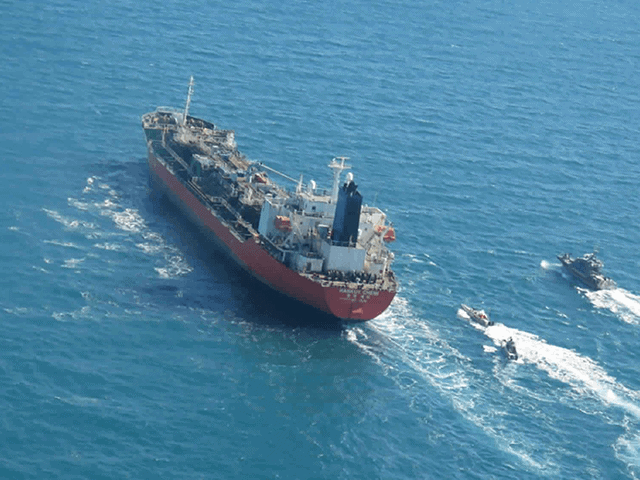Iran Demands Ransom for Seized South Korean Vessel

The Iranian government made its clearest demand to South Korea for a ransom payment to release a captive tanker and crew on Sunday, dismissing South Korea’s diplomatic efforts to secure their release as “politicizing” the issue and telling Seoul to show some “political will” by unfreezing $7 billion of Iranian funds held by South Korean banks.
Iran’s Islamic Revolutionary Guard Corps (IRGC) seized the South Korean-flagged tanker Hankuk Chemi in the Persian Gulf on January 4. The crew of twenty — including citizens of Indonesia, Vietnam, and Malaysia along with South Korean nationals — was taken captive along with the ship.
The Iranian government claims it seized the ship because it was “polluting” the Persian Gulf, a charge dismissed as “absurd” by its owners and operators. Iranian officials have combined denials that the ship and crew were taken hostage with increasingly pointed suggestions that Seoul could grease the wheels for their release by freeing up $7 billion in Iranian assets that were frozen when the United States reimposed sanctions on Iran.
Iran responded to the arrival in Tehran of a diplomatic mission led by South Korean Vice Foreign Minister Choi Jong-kun by dismissing South Korea’s efforts to defuse the crisis and strongly advising it to focus on that $7 billion while continuing to bristle at any suggestion the Iranians are holding the tanker and crew hostage for a ransom.
As Reuters reported Sunday, the Iranians insist South Korea is “politicizing” the situation by negotiating without first unfreezing Iranian funds:
Iran’s deputy Foreign Minister Abbas Araqchi told South Korea’s Choi that Seoul “should refrain from politicising the issue and fruitless propaganda and allow the legal proceedings to proceed”, Iran’s state TV reported.Iran’s government spokesman said on Tuesday the vessel was seized based on an Iranian court order for “environmental pollution”.However, the ship’s Busan-based operator, Taikun Shipping Co. Ltd., told Reuters there was nothing to indicate before the seizure of the vessel that Iranian authorities were probing possible violations of environmental rules.“For about two and a half years, South Korean banks have frozen Iran’s funds … it is not acceptable … In our view, this is more because of Seoul’s lack of political will (to resolve the issue) than the U.S. sanctions,” the semi-official Fars news agency quoted Araqchi as saying.
The Associated Press (AP) noted that South Korea’s diplomatic mission to the Middle East was planned long ago and suggested Iran seized the tanker to gain some leverage before the team from Seoul arrived and before the new administration took office in the United States.
The AP quoted another in the series of Iranian officials who insist South Korea is the real “hostage-taker” for freezing those Iranian funds:
The South Korean delegation, including representatives from Seoul’s Central Bank, were set on Monday to meet Iran’s Central Bank chief Abdolnasser Hemmati to discuss the trapped funds, semi-official Mehr news agency reported. In recent weeks, Hemmati has complained that Iran was struggling to transfer some $220 million held in South Korean banks to pay for COVID-19 vaccines through COVAX, an international program designed to distribute coronavirus vaccines to participating countries.“It is our natural right to be able to use this money,” Hemmati was quoted as saying on Sunday. “We hope that the American pressure will also decrease.”Meanwhile, Araghchi said South Korean banks have illegally blocked Iran’s currency resources for nearly two years and a half citing a fear of the U.S. sanctions, “This action (by South Korea), which is only surrender to ransom demand from the US, is not acceptable, and naturally the expansion of relations (between Tehran and Seoul) would be meaningful only when this problem is solved.”
A source inside the Iranian regime told the Financial Times on Monday that Iran’s seizure of the tanker was an “economic decision to force South Korea to unfreeze billions of dollars of our money,” at a moment when the Iranians believe they can capitalize on political chaos in the United States.
According to this source, the Iranian regime decided the South Koreans “needed a slap in the face, after our quarrels bore no fruits, so they realize that they cannot block Iran’s money when we are desperate to buy medicine and vaccines,” a reference to Iran’s complaints that it cannot access funds in foreign banks it supposedly needs to cope with the coronavirus pandemic.
“They should realize that the answer to our emails is not simply ‘we are sorry.’ Now, they have to come and negotiate with us over their tanker when we can whisper in their ears: ‘where is our money?’” the Iranian insider sneered.
Iran does not seem to have any trouble finding money to finance its nuclear weapons research. Last week, the Iranians announced they would begin enriching uranium to 20 percent purity, the last stage before weapons-grade enrichment is easily reached, and would install a thousand new uranium processing centrifuges. They also showed off a gigantic new underground missile base, boasting that it contains a vast arsenal of expensive and highly advanced long-range weapons.
Photo: Tasnim News Agency via AP
Link: Iran Demands Ransom for Seized South Korean Vessel (breitbart.com)











